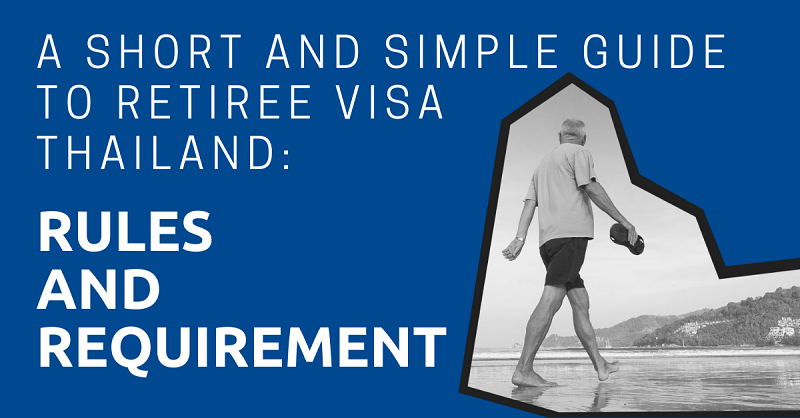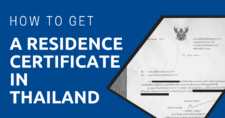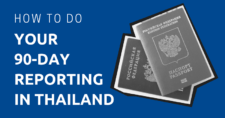
Have you been thinking about retiring in Thailand? Wondering what the requirements are to get a long-term visa?
In this post you’ll find out what financial requirements you need to meet, and which documents you need to present, to qualify for a Thailand retirement visa.
*Check out ExpatDen Premium and gain access to hundreds of exclusive pieces of content that will help you retire in Thailand smoothly and peacefully. With it, you will learn how to open a bank account in Thailand with a tourist visa, how to get affordable yet quality healthcare, how to negotiate your rent down by 40%, and much more.
"*" indicates required fields
Disclaimer: This article may include links to products or services offered by ExpatDen’s partners, which give us commissions when you click on them. Although this may influence how they appear in the text, we only recommend solutions that we would use in your situation. Read more in our Advertising Disclosure.
Contents
- What is it?
- Requirements
- Required Document
- Application Process
- Where to Apply
- How to Show Proof of Funds
- What if You Can’t Open a Bank Account in Thailand?
- Changing a Tourist Visa to a Retirement Visa
- What's the Easiest Way to Get a Retirement Visa?
- Single-Entry or Multiple-Entry?
- Renew Your Retirement Visa (Visa Extension)
- 90-Day Notification
- Visa Restrictions
- Other Retirement Visas
- Now, on to You
What is it?
The Thai retirement visa, or the non-immigrant O or OA long stay visa, lets qualified retirees who are at least 50 years old and meet the specific financial requirements retire in Thailand for up to one year. The one-year visa can then be renewed every year as long as the person applying continues to meet the financial requirements.
Requirements
To get a retirement visa in Thailand, there are five main requirements you need to fullfil:
- age
- financial requirement
- health insurance
- criminal record
- prohibitive disease
Let’s take a look at each one individually.
Please note that the requirements for each nationality can be different and subject to change. Certain Thai embassies may also have different requirements.
Age
To apply for a retirement visa in Thailand, you must be at least 50 years old.
Financial Requirements
To qualify for non-immigrant O or OA visa, you’ll need to show one of these three financial documents:
- copies of your bank statements showing a deposit of the amount equal to and not less than 800,000 baht in your bank account or
- copies of bank statement showing income of not less than 65,000 baht per month or
- a combination of a deposit account and a monthly income totaling at least 800,000 baht
If you go with THB800,000 option, please note that the money need to be in your bank account at least 2 months before the visa application or extension.
Health Insurance
Since April 2019, there’s a new regulation requiring you to have health insurance. The new regulation is officially confirmed on October 31, 2019.
Insurance requirement keep changing all the time.
Right now, here’s what you need: 400,000 baht IPD coverage and 40,000 baht OPD coverage in order to apply a retirement visa.
You can get Luma Long Stay Care plan to get an affordable health insurance plan that passes the visa requirement. If you need something comprehensive, check out the new senior plan from Cigna Global.
Please note that the health insurance requirement usually only applies to those who apply the retirement visa from outside of Thailand.
Criminal Record
You should have no criminal record in your home country and in Thailand
Prohibitive Diseases
You should have no prohibitive diseases, which the Thai Embassy lists as Leprosy, Tuberculosis, drug addictions, Elephantiasis, and Syphilis in its third phase.
Required Document
First thing you’ll want to do for applying the retirement visa is to prepare your required financial documents and all of the following:
- an application form, which can be picked at the immigration office
- passport with at least six months validity and two blank pages on both side.
- 4 cm x 6 cm photos taken in the last six months
- an updated bank passbook
- a bank letter confirming your funds not less than two months from the date of application*
- a health insurance certificate (you may not need this if you’re in Thailand)
- a police/background check certificate
*To get a bank letter visit the bank branch where you opened your account. Tell them you need an official bank letter stating that you had the funds in your account on the date two months out from your application date.
The letter usually costs a few hundred baht, depending on your bank. And it can be done on the same day, usually within an hour.
The bank letter is valid for 7 days, and the balance in your bank book must match that of the bank letter. This means that after you obtain a bank letter, you MUST NOT deposit or withdraw money from your bank account.
If you apply from within Thailand, you will need additional documents, including:
- A copy of your passport, including the information page and all pages related to Thailand visas, such as the visa stamp, extension of stay, and eVisa (if you have it).
- A copy of the departure card (TM6)
- A copy of TM 30 (residence registration)
Normally, you will need two copies of each document. You should also sign all copies and include your name on them.
Sometimes, you may also need two copies of every page in your bankbook as well as your rental contract.
Each immigration office, Thailand Consulate, and Thailand Embassy may require different documents. Therefore, you should contact them in advance to determine the exact documents needed.
Application Process
The application process at each immigration office in Thailand, as well as at Thailand Consulates and Embassies, is generally the same.
Here’s what you need to do:
- Make an online appointment (if you are in Thailand, you have the option to walk in).
- Go to an information desk to get your queue number and have your documents checked.
- Proceed to an immigration office’s counter when your queue number is called.
- Prepare for a short interview. The immigration office may also inquire about your job prior to retirement.
- If everything is satisfactory, the immigration officer will accept your documents and inform you of when you can collect your visa.
- The processing time is approximately 15 business days, although this can vary depending on the specific immigration office, consulate, or embassy.
Please note that sometimes an immigration office may request a Thai name and phone number for reference. Therefore, it’s best to prepare this information in advance.
Where to Apply
You can apply for a retirement visa either in your home country (in some cases) or in Thailand.
Inside Thailand
In most cases, you need to apply for a non-immigrant visa O before you extend your visa in Thailand into a one-year non-immigrant OA visa. You’ll be given 90 days in the kingdom. And after your first 60 days, you can apply for a one-year OA visa.
If you go with this method, after you get a 90-day retirement visa, you need to immediately open a bank account in your name and transfer 800,000 baht into Thailand right away.
This way, you will have the money two months before you can extend the visa.
Bangkok
If you are in Bangkok, you can go to the Division 1 Immigration Office in Bangkok.
Here’s the Google Maps link to Division 1 Immigration Office in Bangkok. It’s known as Chaeng Watthana office or CW in short.
Here’s the physical address:
- 120 Thanon Chaeng Watthana, Khwaeng Thung Song Hong, Khet Lak Si, Krung Thep Maha Nakhon 10210
Just bring with you all of the documents listed in this section and the above requirements section.
Chiang Mai
If you are in Chiang Mai, you can go to Chiang Mai Immigration Office. It’s located near Chiang Mai International airport. Here’s the physical address: 71 Sanaam Bin Road, Mueang Chiang Mai District, Chiang Mai 50200, Thailand.
Phuket
If you are in Phuket, there’s Phuket Immigration Office. It’s conveniently located in the center of Phuket. Here’s the address: 482 Phuket Road, Talad Yai, Muang, Phuket 83000 Thailand.
There’s also another immigration office in Patong. But that’s mainly for a short-term stay such as extending your tourist visa or visa exemption, or a 90-day notification.
Other
There are 58 immigration offices throughout Thailand. Here’s a map to all of them. Please note that it’s best to apply or renew your retiree visa on your local immigration office. If you go to another immigration office, they may not allow it.
Outside Thailand
If you’re applying for your retirement visa outside of Thailand, you’ll be applying for a non-immigrant OA visa.
It allows you to live in Thailand for one year straightaway and can be renewed from within Thailand every year thereafter.
You’ll need to bring the same documents listed above with you to the nearest Thai Embassy in your country.
If you don’t have a Thai bank account yet, it is possible to get a financial statement or a proof of income from your home country.
Nowadays, Thai embassy tend to issue a 90-day non-immigrant OA visa instead. If this is the case, come to Thailand, immediately open a bank account, and transfer 800,000 baht to Thailand right away in order to fulfill the financial requirement.
But don’t be surprised if you the embassy tells you they don’t issue this type of visa to foreigners, as not all of them do.
How to Show Proof of Funds
Showing proof of funds can be a headache for retirement visa applicants.
The most straightforward way to show adequate funds in Thailand is to open a bank account in the country and leave THB800,000 there for two months before applying for or extending your visa.
*Note that as mentioned above, the required balance differs between each type of retirement visa.
Once you open your bank account, you’ll have to get a financial statement showing the required amount. You can get this statement for a few hundred baht at any of your bank’s branches.
Alternatively, you can contact your embassy and request an income affidavit, showing that you have a monthly income of at least 65,000 baht, including pension.
Keep in mind that not all embassies can provide an income affidavit. For example, the US embassy no longer issues it.
What if You Can’t Open a Bank Account in Thailand?
It can be a challenge to open a bank account in Thailand if you’re here on a tourist visa. However, as long as you have a retirement visa, you shouldn’t have any problems opening a bank account in the country.
Therefore, it’s a good idea to get a retirement visa from your home country. You can use a financial statement from your home bank as proof of your income when you apply for your retirement visa at a Thai embassy in your home country.
Once you’re in Thailand, you can open a bank account and manage your funds as mentioned in the above section.
Changing a Tourist Visa to a Retirement Visa
If you enter Thailand with a tourist visa or on a visa exemption, you can apply for a retirement visa within Thailand.
The entire application process and the required paperwork are similar to what’s mentioned above. After applying, you will receive a retiree visa valid for 90 days. Subsequently, you can renew it for a one-year visa and repeat the process annually.
This option is increasingly popular as it does not require a health insurance certificate.
However, if you choose this route, you must have a Thai bank account before arriving in Thailand. Additionally, plan your time wisely, as it may take up to 15 business days to obtain your visa.
What’s the Easiest Way to Get a Retirement Visa?
Many people find it easiest to enter Thailand with a tourist visa or visa exemption and then convert it to a retirement visa. This is mainly because it eliminates the need for a health insurance certificate, which can be challenging to obtain.
However, this option is not feasible for everyone, as it requires having a Thai bank account, which is difficult to secure without a long-term visa. (Therefore, some people opt to use an agent to assist in obtaining a Thai bank account).
In our opinion, obtaining a retirement visa is quite a straightforward process, as long as you have the correct paperwork, regardless of the option you choose.
Single-Entry or Multiple-Entry?
When applying for a retirement visa, you’ll have two options when getting your non-immigrant OA visa: single-entry or multiple-entry.
Single-entry
A single-entry is for anyone who doesn’t plan to leave Thailand. If you do, whether for leisure or in an emergency, you must apply for a re-entry permit. Otherwise, your visa will be cancelled immediately after you exit Thailand.
Multiple-entry
A multiple-entry OA visa lets you leave and enter Thailand as you wish. So if you know that you’re going to come and go quite often while living in Thailand, your best bet is to get a multiple-entry visa from the start.
Renew Your Retirement Visa (Visa Extension)
After you get your visa stamped into your passport, there are three main conditions to keep your retirement visa active:
- you shouldn’t let your balance drop below THB800,000 for three months after you get your visa
- you should maintain at least THB400,000 at all times
- your bank balance needs to be more than THB800,000 at least two months before the visa renewal.
Otherwise, you will not be able to renew your retirement visa.
If you don’t want to leave that much money in your Thailand bank account, then there’s another route you can take. You can show that you have at least THB65,000 going into your bank account every month.
You do it by sending money to your bank account in Thailand each month. If you want to save on transfer fees and exchange rates, you can open a Wise Multi-Currency Account, convert your local currency to Thai Baht when rates are good, and then transfer into Thailand.
When your visa is about to expire, you’ll need to renew it at any of the immigration offices in Thailand. The process is the same as when you first applied.
If you come to Thailand with a Non-OA Visa, you need health insurance to renew your retiree visa. On the other hand, if you come to Thailand with a Non-O visa, then you don’t need health insurance.
You can renew your retiree visa forty-five days in advance before it’s expired.
And it’s not recommended to start your renewal process if you have less than15 days before your visa expires.
Otherwise, you might not have enough time for adjustments if Thai Immigration asks for more documents.
If you want to renew your visa outside of Thailand, you can re-apply at the nearest Thai Embassy.
90-Day Notification
Whether you apply inside or outside of Thailand, you’ll have to do 90-day check ins at Thailand immigration after your visa has been approved.
Visa Restrictions
Retirement visa holders are prohibited from engaging in any type of work.
Other Retirement Visas
Here a few other options you have if retiring in Thailand is in your radar.
Ten-year Retirement Visa (O-X)
The ten-year Thai retirement visa lets affluent retirees from 14 countries stay in Thailand for up to ten years.
Here are those countries: Australia, Canada, Denmark, Germany, Finland, France, Italy, Japan, Netherlands, Norway, Sweden, Switzerland, United Kingdom, and United States.
It is renewable every ten years.
The requirements for this visa are a little different. You’ll need the following to qualify for non-immigrant OX ten-year visa:
- 3 million baht in a bank account, untouched for at least three months from your application date or
- 1.2 million baht in a bank account and 100,000 baht monthly income. After you are in Thailand, your Thai bank account should have at least 3 million baht untouched within a year.
- health insurance that provides you with at 400,000 baht IPD coverage and 40,000 baht OPD coverage (non-optional)
The application process is the same as applying for a non-immigrant O visa. The only difference is that at the end of this process, you must get a re-entry permit.
Thailand Privilege Card (Elite Visa)
The Thailand Privilege Card program, previously known as the Elite Visa, isn’t technically a retirement visa. But it’s a valid option for affluent foreigners who wish to stay long-term in Thailand and avoid visa runs and extensions.
Depending on the membership package, qualified foreigners can stay in Thailand for five to 20 years.
The best thing about the Thailand Privilege Card is that it significantly decreases the time and headaches of dealing with paperwork and immigration officers, and it keeps you updated with the everchanging retirement visa requirements.
You also don’t need to keep having 800,000 baht in your bank account all the time.
Many retirees now go for this route even if they are eligible for the retirement visa.
However, this program is not available to everyone, as there is a membership fee involved. The fee starts at 900,000 baht for a 5-year visa, and for a 15-year visa, it is 2,500,000 baht.
To find out more, read our Thailand Privilege Card review.
Marriage Visa
If you’re married to a Thai national, you can get a non-immigrant visa O based on marriage from the Thai embassy nearest to you or in Thailand at an immigration office. The financial requirements are a little easier to manage.
So this visa is great for those who don’t have enough funds to get a retirement visa.
Now, on to You
That’s how you get yourself a Thailand retirement visa. The process itself is straightforward if you meet the financial requirements and present the right documents.
So be sure to double check the list above and contact your local Thai embassy or Thai immigration office.
If you’ve made it this far and still aren’t sure which visa you should get, feel free to get in touch with us and tell us what you need.










We are an Spanish family of four and in order to get a long term visa without paying the LTR I am going to ask for retirement visa (Non OA) as I am 59, my two daugthers (5 and 11) will go on an student visa (Non ED) and my wife as a dependant visa either sponsored by me or as a tutor of our daugther (she must take the visa after we do). Already checked with the embassy. Spain is not on the shortlist for Non OX visa that would make it simpler.
Hope this could help somebody.
Thanks a lot for letting other readers know about this Jorge!
Married to my Thai wife and I have a Thai bank account. I will enter Thailand on a 90 day non-o visa, what is required nearing the end period to get a 1 year visa based on marriage to a Thai ( don’t want retirement visa). Can the 1 year visa be processed at my local immigration office ( not Bangkok).
This mainly depends on where you file your TM 30. If it’s in your local immigration office, then, you should be able to do it there.
How far back does your police check go (criminal history)
Normally, it’s a life long.
If my wife is less than 40 yrs old, can she join me in Thailand if I retire there?
Yes, she can make a dependent visa based on your retiree visa.
I don’t see anything about the combination method, in which I’ve read you can keep 400k in the bank and get and affidavit or verification of income of at least 50k per month. The US is not doing affidavits but I understand some countries will do that. Can anyone from one of those countries verify that and what do they require for the affidavit? Actual proof of the income or just ‘raise your right hand”?
I’m a Pakistan national living in Dubai, over 50. Am planning and apparently eligible to get a Thai Retirement visa (have the local bank A/C, the funds, and a visitor multiple entry visa).
My question is, how do I bring in my non-Thai wife who is not 50 years old?
You need to get a retiree visa first. After that, get your wife a dependent visa based on your retiree visa.
How do I open a Thai bank account without actually having the retirement visa issued – do they let tourists on visitor visas open accounts? Or can I open it in a UK based Thai bank maybe…like the Bangkok Bank for example.
There is no way that you can renew your Non O retirement visa 3 months before it expires! It’s 45 days at most. I just checked.
Hey David, Thanks a lot for letting us know about it. It’s definitely a challenge to keep this article up-to-date since regulations are changing quickly all the time.
Anyway, we just updated it based on your information.
I have an O-A multiple entry visa. As this is the first year with this visa, I do not need the 800,000 THB account. If I want to extend I do.
I am told that if I leave Thailand, I can apply for the same visa again, and avoid the 800,000 THB requirement. Can someone verify if this is correct?
Thx
As far as I know, the 800k THB requirement is required for a retiree visa.
Hi, I have just retired here on the OA visa, the 800,000 was not a requirement but I had to show proof when I applied for my visa in Australia to the Royal Thai Embassy in Canberra that I do have income amounting to at least 65,000THB per month. I have opened a bank account and now transfer that amount each month from my bank in Australia. When I do my 90 day reporting (haven’t done my first one yet) I will get my bank book updated to show that I am transferring that money each month and consequent ninety-day reports. It was a little tricky opening a bank account I had to go to type immigration to get a couple of forms that the bank insisted on but as soon as I did that there was no problem opening one and I now also have a debit card, the bank app and Internet banking.
Thanks for the additional info Gordon, and have a great time in Thailand.
Just retired at 67 I nouw seek to live in Thailand our own home. But bank statements does not show 800 000 Bart I arrived on a multy entry O visa , is there anyway , to stay in Thailand? With only a pention as income . Is a bank credit note a possibility.? To use instead of dead money on the bank acound .?
If you don’t have 800,000 baht in your bank, then it’s either one of these:
– copies of bank statement showing income of not less than 65,000 baht per month or
– a combination of a deposit account and a monthly income totaling at least 800,000 baht
I believe Thailand calculates age differently. If I was born in 1973 & it’s 01/01/2023 now, am I considered 50 years old & therefore qualified for the age criteria for a Thailand Retirement Visa even though my birthdate is not until December 2023? I would really appreciate the answer to this question. Thanks
If you were born on December 1973, you will not be fully 50 years old until it is December 2023.
Hi , I want to apply for the O A Visa but have a minor police conviction for a public order offence in UK from 2015 . Would my application be refused on the grounds of this or would it be possible to still be successful for the Visa ?
I read in several places that the financial requirements must be met with funds in a Thai bank. However I read on the Thai Embassy website in Washington, DC that it can be either a Thai or U.S. bank. Of course no one is answering the phone or emails at the Thai embassy these days for general questions. This is the first time I’m hearing that the financial requirement can be met with funds in a U.S bank. Is that right?
Yes, if applying from abroad, including from the States, it should be possible to use your local bank. But please do note that once you are in Thailand, you should quickly open a bank account and move your fund here as soon as possible. You need at least 800k THB in your Thai bank account 2 months before being able to extend a visa.
Another question based on your answer: I don’t and probably won’t (maybe ever) have the 800000baht in a bank account. However, my US Social Security income is around $3000 per month, which would qualify me for the OX visa. It looks like this would meet the requirement for the initial application. I wondering, though, if the 800000baht is an absolute requirement for extending the visa, or will the monthly income satisfy that? Thank you.
Your income should be okay for the normal retirement visa. Right now, you don’t need to show 800,000 baht in your bank if you have a proof of monthly income of at least 65,000 baht in order to extend the visa. However, if you want to be sure, it’s best to have 800,000 baht in your bank.
On the other hand, if you want to go for the O-X visa, your income isn’t enough now. They just changed the regulations saying that you need to have at least 1.2 million baht in your bank, together with an annual income of 1.2 million baht.
I just started collecting my SSA 3 months ago and tried to use this as proof of income during my O-Visa application. First of all your SSA needs to be direct deposited into a Thailand Bank and cannot be a foreign account Period. Which I did do and have the specific 3 direct deposits statements from my Thai Bank stating funds from the Federal Reserve deposits. But that will not be enough for me to use that as my income this year. For some reason or regulation I will be required to show 12 consecutive direct deposits into my Thai account to qualify. So I’ll have to wait till next years renewal when that will be possible. I just started getting my SSA 3 months ago so this is impossible. Luckily I had all the necessary paperwork to qualify for the 800k deposit. Good luck
Thanks a lot for sharing this Robert!
Thanks for this post. I have a similar comment to someone above that wasn’t answered. If we are applying for a Retirement Visa from outside Thailand, and haven’t had a prior visit where we’ve set up a bank account to deposit funds, how is this piece handled? How to have proof of funds when we haven’t arrive in country yet? OR, Do we arrive on our 90-day Non-OA and set up account in that first 30 days so when we go to immigration to convert to Retirement visa, we show them the account? Or? The bank account part is confusing for people applying outside the country.
Other question is about bringing household goods overseas shipment. Does retirement visa allow duty free entry of our personal belongings? Thanks for all your help!
If applying from your home country, you should be able to use a financial statement issued by a bank in your home country. Some Thailand Embassy/consulate might also accept your taxation document as well.
About shipping household goods, yes, you don’t need to pay a custom tax with a retirement visa. You can read it more here: https://www.expatden.com/thailand/how-to-avoid-customs-tax/
Gooday,
I have just sold my Condo in Thailand, could I use the funds from the sale to obtain a retirement visa? I am over 50 years
Yes, you should be able to do that. Please note that you need to have at least 800,000 baht in your Thai bank account 2 months before applying for the visa.
Im a US citizen who meets all requirements for any type of retirement visa. Would you suggest I apply here in the states before arriving? Or maybe just do a tourist visa, then apply there? With regards to the tourist visa, what is the current length of time? 60 days? 90 days? I am fully vaccinated & understand Phuket will allow entry after July 1 without quarantine (unless that changes). either way I go, I will need to travel out of Thailand on a semi frequent basis, so maybe just the 90 day tourist visa? Need to know how long before booking air travel.
Currently the situation in Thailand isn’t stable because of COVID-19, everything is subject to change. The normal tourist visa isn’t available at the moment.
So, in your case, it might be better to apply the O-X retirement visa right from the United States. It comes with a renewal 5-year retirement visa and you can use it to enter Thailand.
Can I apply for a Retirement visa from a Non-B visa?
Are there advantages to having a Retirement visa rather than a Non-O?
To do that, you need to first cancel your non-b visa and apply a retirement visa, which can be tricky because of the current pandemic. If possible, it should be better to keep your non-b visa as of now.
The retirement visa is actually a part of the non-o visa.
To renew a Retirement Visa now (Mar 2021) do you have to go to Muang Thong Thani or to the main office in Chaeng Wattana?
Is Thai health insurance required for a marriage visa (my wife is Thai)?
As of now, you don’t need to have health insurance to apply for the marriage visa.
From article – “Currently you need to have at least 800,000 baht in your Thai bank account for at least two months before applying for the visa”
So I am currently now outside Thailand and want to apply for the retirement visa but do not have a Thai bank account, and I am not in Thailand to apply for a Thai Bank account? So what is the alternative?
I found opening a bank account in Thailand very difficult.
They apparently are cautious and don’t trust Farlangs.
Took me 3 days and documentation that was unbelievable.
Looking for agent to accompany me and expedite the process for renewal of my 1 year retirement visa and obtain a 5 year retirement visa,
Money and ins. requirements are met
Insurance only applies to OA not to O. OA issued in home country.. O issued if you convert tourist visa inside Thailand. When you receive your first O it last 3 months. That gives you 3 months to apply for extension of stay for 1 year. This is still an O visa not OA as stated above.
From 31 Oct 2019 all OA renew application must have health insurance cover to the Thai gov specification. Applicants in Pattaya being told it must be insurance from a Thai company. Insurance from outside Thailand not accepted. Application will be rejected.
Many insurance companies have produced products that cover farlang to the basic Gov specified visa requirements.
For real? We’re here on a non-immigrant O which we extended with a retirement visa. According to the above info. we can renew our retirement extension without insurance… yes?
“To get a retirement visa in Thailand, you must be at least 50 years old, have no criminal record in your home country and in Thailand”
Does that mean a DUI conviction from around 40 yrs ago negates eligibility???